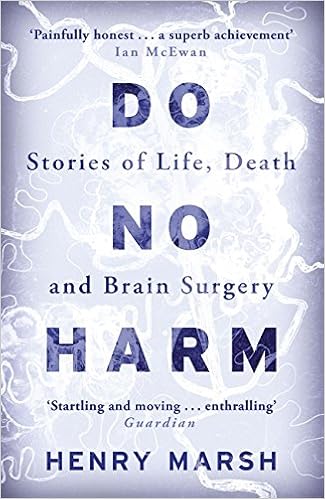Tuesday, 30 May 2017
Allan Ropper: Reaching Down the Rabbit Hole: Extraordinary Journeys into the Human Brain
What is it like to try to heal the body when the mind is under attack? In this gripping and illuminating book, Dr Allan Ropper reveals the extraordinary stories behind some of the life-altering afflictions that he and his staff are confronted with at the Neurology Unit of Harvard's Brigham and Women's Hospital. Neurologists diagnose and treat serious illnesses of the brain by combining the hard science of medical knowledge with the art of intuitive reasoning. The unique challenge they face is that their primary sources of information - the patients' brains - are quite often altered, sometimes bizarrely, as a result of disease. Like Alice in Wonderland, Dr Ropper inhabits a place where absurdities abound: a sportsman who starts spouting gibberish; an undergraduate who suddenly becomes psychotic; a salesman who drives around and around a roundabout, unable to get off; a mother who has to decide whether a life locked inside her own head is worth living. How does one begin to treat such cases, to counsel people whose lives may be changed forever? How does one train the next generation of clinicians to deal with the moral and medical aspects of brain disease? Dr Ropper answers these questions by taking the reader into a world where lives and minds hang in the balance
Wednesday, 26 April 2017
Claudia Rossbacher: Steirerpakt - Sandra Mohr 07
 Ein skurriler Leichenfund lässt die LKA-Ermittler Sandra Mohr und Sascha Bergmann zur Eisenstraße aufbrechen. Vom historischen Einser-Sessellift, der seit fast 70 Jahren vom Präbichl auf den Polster schaukelt, wurde eine nackte Leiche geborgen. Bald schon wird der tote Mann als Einheimischer identifiziert, der vor 15 Jahren nach Kanada auswanderte. Erst vor wenigen Tagen reiste der Arzt aus seiner Wahlheimat an, um dem Begräbnis seiner Mutter beizuwohnen. Sandra Mohr stößt auf so manche alte Wunde, die er dabei aufgerissen hat. Und auf weitere Leichen...
Ein skurriler Leichenfund lässt die LKA-Ermittler Sandra Mohr und Sascha Bergmann zur Eisenstraße aufbrechen. Vom historischen Einser-Sessellift, der seit fast 70 Jahren vom Präbichl auf den Polster schaukelt, wurde eine nackte Leiche geborgen. Bald schon wird der tote Mann als Einheimischer identifiziert, der vor 15 Jahren nach Kanada auswanderte. Erst vor wenigen Tagen reiste der Arzt aus seiner Wahlheimat an, um dem Begräbnis seiner Mutter beizuwohnen. Sandra Mohr stößt auf so manche alte Wunde, die er dabei aufgerissen hat. Und auf weitere Leichen...Saturday, 22 April 2017
Henry Marsh: Do No Harm: Stories of Life, Death and Brain Surgery
What is it like to be a brain surgeon?
How does it feel to hold someone's life in your hands, to cut through the stuff that creates thought, feeling and reason?
How do you live with the consequences when it all goes wrong?
DO NO HARM offers an unforgettable insight into the highs and lows of a life dedicated to operating on the human brain, in all its exquisite complexity. With astonishing candour and compassion, Henry Marsh reveals the exhilarating drama of surgery, the chaos and confusion of a busy modern hospital, and above all the need for hope when faced with life's most agonising decisions.
Friday, 31 March 2017
Jo Marchant: Cure: A Journey Into the Science of Mind over Body
ALL IN THE MIND?
- Can meditation fend off dementia?
- Can the smell of lavender affect the immune system?
- Can your thoughts ease physical pain?
- Can the smell of lavender affect the immune system?
- Can your thoughts ease physical pain?
In Cure, award-winning science writer Jo Marchant travels the world to meet the physicians, patients and researchers on the cutting edge of mind-body medicine. Asking how the brain can heal the body and how we can all make changes to keep ourselves healthier.
Thursday, 30 March 2017
Daisy Goodwin: The Fortune Hunter
The Fortune Hunter
In 1875, Sisi, the Empress of Austria is the woman that every man desires and every woman envies.
Beautiful, athletic and intelligent, Sisi has everything - except happiness. Bored with the stultifying etiquette of the Hapsburg Court and her dutiful but unexciting husband, Franz Joseph, Sisi comes to England to hunt. She comes looking for excitement and she finds it in the dashing form of Captain Bay Middleton, the only man in Europe who can outride her. Ten years younger than her and engaged to the rich and devoted Charlotte, Bay has everything to lose by falling for a woman who can never be his. But Bay and the Empress are as reckless as each other, and their mutual attraction is a force that cannot be denied.
Full of passion and drama, THE FORTUNE HUNTER tells the true story of a nineteenth century Queen of Hearts and a cavalry captain, and the struggle between love and duty.
In 1875, Sisi, the Empress of Austria is the woman that every man desires and every woman envies.
Beautiful, athletic and intelligent, Sisi has everything - except happiness. Bored with the stultifying etiquette of the Hapsburg Court and her dutiful but unexciting husband, Franz Joseph, Sisi comes to England to hunt. She comes looking for excitement and she finds it in the dashing form of Captain Bay Middleton, the only man in Europe who can outride her. Ten years younger than her and engaged to the rich and devoted Charlotte, Bay has everything to lose by falling for a woman who can never be his. But Bay and the Empress are as reckless as each other, and their mutual attraction is a force that cannot be denied.
Full of passion and drama, THE FORTUNE HUNTER tells the true story of a nineteenth century Queen of Hearts and a cavalry captain, and the struggle between love and duty.
Saturday, 25 February 2017
Marcus Sedgwick: The Foreshadowing

The Foreshadowing
It is 1915 and 17 year-old Sasha Fox is trapped by her own terrible and tragic power. She can see the future, can see what will happen to her much-loved brothers Edgar and Tom who have gone to war and, worse still... who would want to see the end of their own story?
Saturday, 4 February 2017
Oliver Sacks: The Man Who Mistook His Wife for a Hat
In his most extraordinary book, The Man Who Mistook His Wife for a Hat, Oliver Sacks recounts the stories of patients lost in the bizarre, apparently inescapable world of neurological disorders.
These are case studies of people who have lost their memories and with them the greater part of their pasts; who are no longer able to recognize people or common objects; whose limbs have become alien; who are afflicted and yet are gifted with uncanny artistic or mathematical talents.
In Dr Sacks’s splendid and sympathetic telling, each tale is a unique and deeply human study of life struggling against incredible adversity.
These are case studies of people who have lost their memories and with them the greater part of their pasts; who are no longer able to recognize people or common objects; whose limbs have become alien; who are afflicted and yet are gifted with uncanny artistic or mathematical talents.
In Dr Sacks’s splendid and sympathetic telling, each tale is a unique and deeply human study of life struggling against incredible adversity.
Friday, 27 January 2017
Suzanne O'Sullivan: It's All in Your Head -True Stories of Imaginary Illness
 Most of us accept the way our heart flutters when we set eyes on the one we secretly admire, or the sweat on our brow as we start the presentation we do not want to give. But few of us are fully aware of how dramatic our body’s reactions to emotions can sometimes be.
Most of us accept the way our heart flutters when we set eyes on the one we secretly admire, or the sweat on our brow as we start the presentation we do not want to give. But few of us are fully aware of how dramatic our body’s reactions to emotions can sometimes be.Take Pauline, who first became ill when she was fifteen. What seemed at first to be a urinary infection became joint pain, then food intolerances, then life-threatening appendicitis. And then one day, after a routine operation, Pauline lost all the strength in her legs. Shortly after that her convulsions started. But Pauline’s tests are normal; her symptoms seem to have no physical cause whatsoever.
Pauline may be an extreme case, but she is by no means alone. As many as a third of men and women visiting their GP have symptoms that are medically unexplained. In most, an emotional root is suspected and yet, when it comes to a diagnosis, this is the very last thing we want to hear, and the last thing doctors want to say.
Subscribe to:
Comments (Atom)






